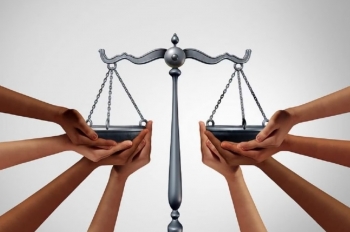
.png) Dr Suresh Mathew
Dr Suresh Mathew

The United Nations started observing the World Day of Social Justice on February 20, 2009. The very need to declare a day for social justice 64 years after the world body came into existence tells a story not so music to ears. It exposes the underbelly of societies catering to poverty, exclusion, unemployment, human rights violations and more. Though observance of a ‘day for justice’ may not in itself bring about better days in the lives of the victims, yet it would throw spotlight on injustices hounding people at various levels.
The theme for this year focuses on ‘achieving social justice through formal employment.’ It assumes an added significance in the present context as millions of people lost jobs in the wake of the pandemic. Though employees of every sector were victims, the worst sufferers were workers of informal sectors who were thrown out of jobs in droves. Hence the best way to rectify this injustice would be shifting workers from informal sector to formal sector.
As many as 60 per cent of world work force is in informal sector, making them vulnerable to unforeseen situations. In India, according to reliable data, this figure goes up to 90 per cent. With such high concentration of work force in informal sector one can imagine their fate during the pandemic. The injustice meted out to this huge number of people could be anyone’s imagination. According to the Centre for Monitoring Indian Economy, this number hovers around 10 million during the second wave of the pandemic alone.
It is equally important to look at the widespread injustices, which show no sign of fading out, despite the country progressing in many fields. One of the ironies of the present day is: The country is progressive on one side, but regressive on the other. There is no dearth of paradoxes in the country. We make efforts to send people to moon, but put roadblocks if a Dalit bridegroom tries to ride a horse on his wedding day; we offer aarti to women and worship them as goddesses, but pounce on hapless girls and assault them when they are caught in insecure situations; we preach values of inter-caste and inter-religious marriages, but club to death the hapless youngsters found marrying outside their caste or religion; we are proud of constitutional values like fundamental rights, but will barge into kitchens to look for what people eat; we vouch for freedom of religion, but place curbs on innocuous religious practices; we talk about freedom of speech, but impose sedition charges against those who dissent from the voice of the government. The unprecedented increase in lynching, hate speech and cow-vigilantism are adding to the index of social injustices confronting the people.
Social justice demands a level-playing field for all irrespective of their caste, creed, language, religion and region. All forms of governance become meaningless unless social justice is protected like one’s eye balls. Any civilized society has to make sure that it safeguards the five cardinal principles of social justice – rights, equal opportunities, diversity, access to resources and participation. Unfortunately, the country is going through a period in which these pillars of social justice are partially eroded.